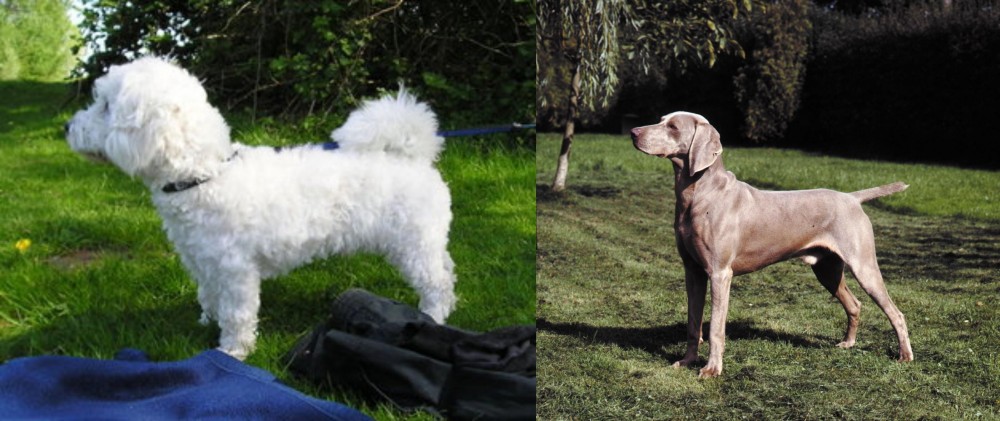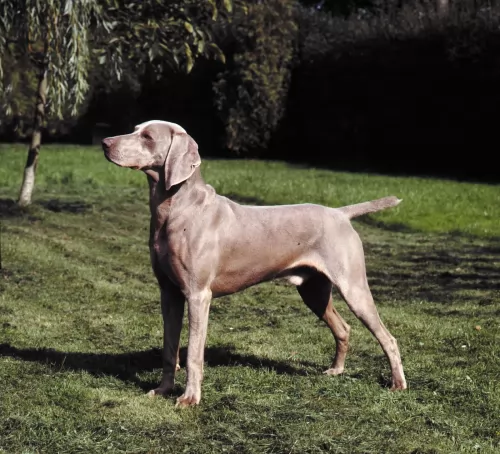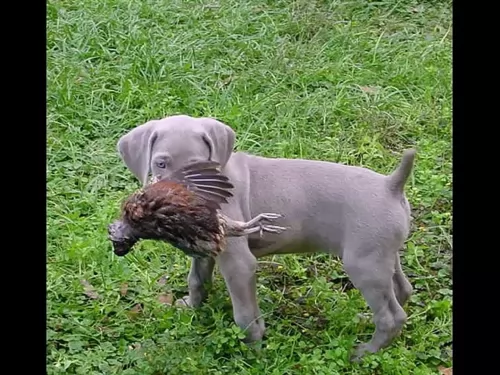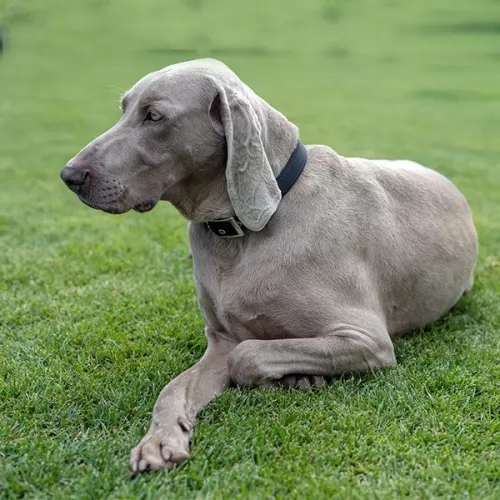 Petzlover
Petzlover Franzuskaya Bolonka is originated from France but Smooth Haired Weimaraner is originated from Germany. Franzuskaya Bolonka may grow 43 cm / 16 inches shorter than Smooth Haired Weimaraner. Franzuskaya Bolonka may weigh 35 kg / 77 pounds lesser than Smooth Haired Weimaraner. Both Franzuskaya Bolonka and Smooth Haired Weimaraner has almost same life span. Franzuskaya Bolonka may have less litter size than Smooth Haired Weimaraner. Both Franzuskaya Bolonka and Smooth Haired Weimaraner requires Low Maintenance.
Franzuskaya Bolonka is originated from France but Smooth Haired Weimaraner is originated from Germany. Franzuskaya Bolonka may grow 43 cm / 16 inches shorter than Smooth Haired Weimaraner. Franzuskaya Bolonka may weigh 35 kg / 77 pounds lesser than Smooth Haired Weimaraner. Both Franzuskaya Bolonka and Smooth Haired Weimaraner has almost same life span. Franzuskaya Bolonka may have less litter size than Smooth Haired Weimaraner. Both Franzuskaya Bolonka and Smooth Haired Weimaraner requires Low Maintenance.
 The Franzuskaya Bolonka in France is known as the Tsvetnaya Bolonka in Russia and in Germany as the Bolonka Zwetna. All of these translate to Colored Bolognese. It is known as the “Pride of Russia” and was rediscovered by the Russians following the thaw of the Cold War. It is also sometimes translated as a colored lapdog.
The Franzuskaya Bolonka in France is known as the Tsvetnaya Bolonka in Russia and in Germany as the Bolonka Zwetna. All of these translate to Colored Bolognese. It is known as the “Pride of Russia” and was rediscovered by the Russians following the thaw of the Cold War. It is also sometimes translated as a colored lapdog.
The Bolonka is a rare breed in the toy category with ancestors in the Bichon Friese line. This little dog looks very much like the national dog of Cuba – the Havanese. In addition to the Bichon other small dogs in this ancestral line include the Shih Tzu, Toy Poodle, and Pekingese as well as the French, Italian and German Bolonka. They are often confused with the Bolognese as both breeds appear in various countries and have many similarities.
In all countries the common name for this dog is the Bolonka. They have a variety of names and nick names depending on the country. In addition to being the “Pride of Russia” he is called a Russian colored Bichon, Czechs call it the Bareyny Bolonsky, the Germans since 1980 have called it the Bolonka Zwetna but the Nordic Kennel Union does not recognize the Zwenta only the Russian Twetnaya.
The French version is seen to be the original with its ancestry dating back to the 18th century when Russian nobles were presented with a Bolonka by Louis XIV of France, and others migrated with the army of Napoleon to Russia. They were still known as the Bolonka of France. Small dogs were not popular in Russia due to the need for dogs that could work on farms and/or hunt. Particularly during the Soviet years, they were considered unnecessary. No Bolonkas were imported to Russia during the Soviet regime, so only localized breeding took place. The goal of breeders in the Soviet Union was to develop a toy dog, lap sized with an apartment living temperament.
During the cold war the Russians sent a pair of breeding Franzuskaya Bolonka to East Germany and they began to develop the breed there as well. At the same time the colored versions of the Bolonka were being bred. The Franzuskaya Bolonka is recognized by the Verband Dur Das Deutsche Hundewesen (VDF) while the other colored breeds are not. The white Bolonka is not recognized by the Federation Cynoloqique Internationale as a breed separate from the Bolognese but as simply another version. Individual clubs throughout the world recognized one or more versions of the Bolonka. They are thought to be the rarest within the Bichon family.
Today’s Bolonka is owed by Prince William and Princess Kate, giving the breed more publicity than it has had in many years.
 The Smooth Haired Weimaraner is a beautiful silvery-grey dog that was once bred for hunting way back in the 19th century.
The Smooth Haired Weimaraner is a beautiful silvery-grey dog that was once bred for hunting way back in the 19th century.
He has always been described as an all-purpose gun dog bred from crossing different German and French hunting dogs with the Bloodhound.
History of this dog dates back to 1897. This is when a club was formed in Germany for the breed.
 The Franzuskaya Bolonka is neither heavy boned nor fine boned. They are a toy breed with a moderate bone structure. The ears are neither long nor short and they have tails that touch the back at the tip. Like others in the Bichon family the Franzuskaya Bolonka does not shed. He is a sturdy little dog and the male has a distinct beard and moustache that the females of the breed do not. They have long coats that are wavy and curly. The Franzuskaya Bolonka is of course only white. The Russian version might be brown, red, black, wolf-gray, gray and of course white.
The Franzuskaya Bolonka is neither heavy boned nor fine boned. They are a toy breed with a moderate bone structure. The ears are neither long nor short and they have tails that touch the back at the tip. Like others in the Bichon family the Franzuskaya Bolonka does not shed. He is a sturdy little dog and the male has a distinct beard and moustache that the females of the breed do not. They have long coats that are wavy and curly. The Franzuskaya Bolonka is of course only white. The Russian version might be brown, red, black, wolf-gray, gray and of course white.
 The lean, well muscled Smooth Haired Weimaraner is athletic to look at, brimming with energy and vitality. The coat is smooth and short and is a magnificent steel grey to silver coat which even tends to be a blue-grey color.
The lean, well muscled Smooth Haired Weimaraner is athletic to look at, brimming with energy and vitality. The coat is smooth and short and is a magnificent steel grey to silver coat which even tends to be a blue-grey color.
The short coat makes the dog low maintenance. He is also a low shedding dog. He is a medium to large sized dog standing at between 57 and 70cm in height and weighing in the region of 25 to 40kg.
The tail has always been docked, giving him that distinctive, dignified appearance. The tail then measures about 6 inches in length.
These dogs are also excellent water dogs with their webbed paws. The ears of the dog are medium length and floppy and the eyes are light amber or a blue-grey color.
You just have to look at the Smooth Haired Weimaraner and you can see how he just loves being with his human owner all the time, so much so that he is known for separation anxiety. Sometimes he can become so distraught separated from his owner that he can even injure himself trying to reach his owner. Being separated for too long can cause him anxiety issues.
Certainly this dog is going to need the right kind of training and socialization to calm him. They’re also full of energy too and are going to require a good amount of exercise.
 The Bolonka is great with kids, just avoid too intense play.
The Bolonka is great with kids, just avoid too intense play.
The Bolonka is a playful, lap dog with a lot of love to offer
Good adaptability great in the city in apartments and great in the country as well
They are very smart and love to learn. Being firm but beyond firm is also kind.
 Your distinctive silvery-grey Weimaraner with his velvety ears and striking eyes is such a loving dog, desiring to be with his human family as much as possible.
Your distinctive silvery-grey Weimaraner with his velvety ears and striking eyes is such a loving dog, desiring to be with his human family as much as possible.
They are also good with children. Their loving nature and eagerness to please will ensure that you have a fully integrated 4 legged family member in your home who wants to be involved with everything you're busy with.
 Medical issues are not fully documented because of the rarity of the breed and the years of isolation in the Soviet Union.
Medical issues are not fully documented because of the rarity of the breed and the years of isolation in the Soviet Union.
 There are some common dog illnesses that most dog owners fear, and hip dysplasia is one. Fortunately the Orthopedic Foundation for Animals tells us that Weimaraners aren’t prone to this dysplasia the way some dogs are.
There are some common dog illnesses that most dog owners fear, and hip dysplasia is one. Fortunately the Orthopedic Foundation for Animals tells us that Weimaraners aren’t prone to this dysplasia the way some dogs are.
One cause for concern however is bloat, and as a deep chested dog breed, the Short Haired Weimaraner can be prone to this life threatening illness.
Known also as gastric torsion, the stomach swells up and the dog becomes lethargic and restless. Immediate veterinary intervention is required. One way to diminish your dog’s chances of getting bloat is to rather feed him two smaller meals a day as opposed to one large meal.
Also, skin allergies are fairly common with these dogs. If redness appears on the skin or the skin is dry and itchy with a rash and he is losing his hair, you may well need to get your pet to the vet. It is why we always recommend giving your pet some raw meat added to the diet and this can help to prevent skin allergies.
 Feed at least 3 meals a day. Feed one fourth of a cup daily split into three meals of a high quality puppy food.
Feed at least 3 meals a day. Feed one fourth of a cup daily split into three meals of a high quality puppy food.
Feed at least 2 meals per day. Feed one half of a cup daily split into two meals of a high quality dry food.
Fairly healthy breed due to isolation during cold war
The Franzuskaya Bolonka is developed as a lap dog but that does not mean he doesn’t need daily exercise. He loves to play but play gently and not for any length of time. They like to chase balls, play hide and seek and any tricks you want to teach them.
 Every dog, especially the Smooth Haired Weimaraner with his anxiety issues, should be trained and socialized, and these dogs are easy to train because they’re intelligent and they want to please.
Every dog, especially the Smooth Haired Weimaraner with his anxiety issues, should be trained and socialized, and these dogs are easy to train because they’re intelligent and they want to please.
The short silvery coat simply requires a good brush-down twice a week to remove the few loose hairs there are. Even if you don’t need to brush him, just do it because of the type of dog the Weimaraner is.
He loves the closeness of owner and dog. It’s a good time to check him over for ticks and fleas, to feel for unusual lumps, to look inside his ears for signs of infection, to check his eyes too, that they’re bright and clear.
If you feed your Smooth Haired Weimaraner commercially manufactured dog food, it needs to be one of the best ones with fairly high protein content. If feeding kibble, you can enhance the food by adding in some tasty home-made food. The Weimaraner’s stomach is easily upset so you want to add in easily digestible home-made food free of exotic spices and richness.
Boiled chicken, brown rice or pasta and spinach, sweet potatoes and carrots is super tasty and nutritious. Your Weimaraner will love such simple, good food and you can add a little to his dry kibble twice a week.
Also important is to add in some raw meat as this ensures a healthy skin. Make sure he has a constant supply of cool, fresh water.